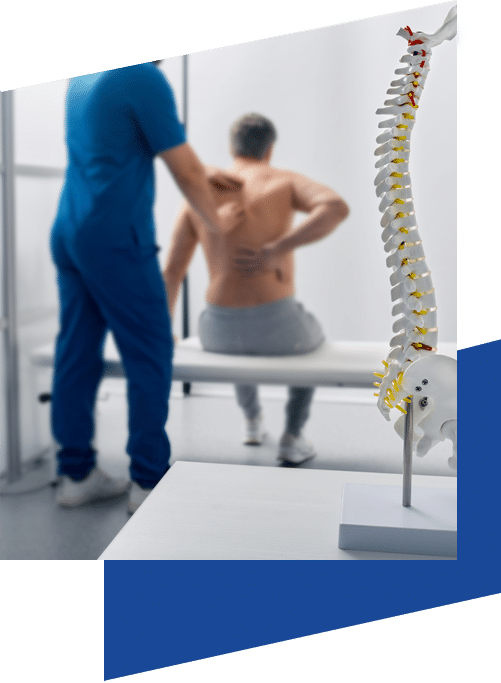Disc Herniation Injury at Infinity Allied Healthcare
At Infinity Allied Healthcare, we provide personalised care for individuals suffering from disc herniation, focusing on accurate diagnosis and tailored treatment plans to alleviate discomfort and enhance quality of life. Our approach combines manual therapy techniques, targeted exercise rehabilitation, and pain management strategies to address symptoms and promote spinal health.
Through patient education and collaborative care, our multidisciplinary team aims to empower individuals with the knowledge and tools needed to manage their condition effectively, prevent future complications, and achieve optimal outcomes in their recovery journey.
Advanced Physiotherapists Advanced and modern manual therapy and hands-on technique |
1 on 1 Treatment We listen and aim to help achieve your goals |
Quick Diagnostics We quickly find the root of the condition resulting in great improvements in pain and recovery |
Highest Standard of Care Professional, positive and caring staff |
What is Disc Herniation?
Disc herniation, also known as a herniated disc or slipped disc, is a common injury affecting the intervertebral discs of the spine. These discs act as cushions between the vertebrae, providing flexibility and shock absorption to the spine. When a disc herniation occurs, the inner core of the disc protrudes through the outer layer, often due to wear and tear or sudden trauma. This protrusion can press on nearby nerves, causing pain, numbness, tingling, or weakness in the affected area.
Disc herniation can occur in any part of the spine but is most common in the lower back (lumbar spine) and the neck (cervical spine). Symptoms vary depending on the location and severity of the herniation but may include back pain, leg pain (sciatica), arm pain, and muscle weakness. Treatment options range from conservative measures such as rest, physical therapy, and pain management to more invasive interventions like surgery in severe cases. Early diagnosis and appropriate management are crucial for relieving symptoms and preventing further complications associated with disc herniation injuries.


What causes Disc Herniation Injury?
Disc herniation injuries can result from various factors and activities that put stress on the spine. Some common causes include:
Degenerative Changes: As people age, the intervertebral discs naturally lose water content and elasticity, making them more prone to herniation. Degenerative changes in the discs weaken their structure, increasing the risk of herniation.
Trauma or Injury: Sudden trauma, such as a fall, car accident, or sports-related impact, can cause a disc herniation by exerting excessive force on the spine and disrupting the integrity of the discs.
Improper Lifting Technique: Lifting heavy objects with improper body mechanics, such as bending and twisting the spine instead of using the legs, can strain the discs and lead to herniation.
Repetitive Strain: Repetitive movements or activities that involve bending, twisting, or lifting heavy loads without proper rest or conditioning can gradually weaken the discs and contribute to herniation over time.
Obesity: Excess body weight can increase the load on the spine and accelerate disc degeneration, raising the risk of herniation.
Genetics: Genetic factors may play a role in predisposing individuals to disc herniation by influencing the structure and integrity of the discs.
Smoking: Smoking can impair the blood supply to the discs, hampering their ability to heal and increasing the likelihood of herniation.
Understanding the potential causes of disc herniation can help individuals take preventive measures and adopt lifestyle modifications to minimize their risk of sustaining this type of injury.
How Can Disc Herniation Be Detected?
Disc herniation can be detected through a combination of clinical evaluation, imaging studies, and diagnostic tests. Here are some common methods used to diagnose disc herniation:
1. Medical History and Physical Examination: A healthcare provider will typically begin by taking a detailed medical history and conducting a thorough physical examination. They will inquire about symptoms, such as pain, numbness, tingling, and weakness, and assess physical signs, such as muscle strength, reflexes, and range of motion.
2. Imaging Studies:
- MRI (Magnetic Resonance Imaging): MRI is the most common imaging modality used to diagnose disc herniation. It provides detailed images of the spine, including the intervertebral discs, spinal cord, and nerve roots, allowing healthcare providers to visualize any abnormalities, such as disc bulges or herniations.
- CT (Computed Tomography) Scan: CT scans may be used to assess the bony structures of the spine and provide detailed images of the spinal canal. They are sometimes used in conjunction with MRI to evaluate disc herniation, especially if MRI is contraindicated or if additional information is needed.
3. Electrodiagnostic Tests: Electromyography (EMG) and nerve conduction studies (NCS) may be performed to assess nerve function and identify any nerve compression or damage associated with disc herniation. These tests involve measuring the electrical activity of muscles and nerves, helping to determine the location and severity of nerve involvement.
4. Provocative Tests: Certain physical maneuvers or provocative tests, such as the straight leg raise test (SLR) for lumbar disc herniation, may be performed during the physical examination to reproduce symptoms and further support the diagnosis.
5. Clinical Correlation: The results of diagnostic tests are interpreted in the context of the patient’s clinical presentation, including symptoms, physical findings, and medical history, to confirm the diagnosis of disc herniation and guide treatment decisions.
Early and accurate diagnosis of disc herniation is crucial for initiating appropriate treatment and preventing potential complications. Therefore, individuals experiencing symptoms suggestive of disc herniation should seek prompt medical evaluation for further assessment and management.

How can Infinity Allied Healthcare Help?
At Infinity Allied Healthcare, we offer personalized and comprehensive care for individuals struggling with disc herniation. Our experienced healthcare professionals conduct thorough assessments to accurately diagnose the condition and develop tailored treatment plans that may include physical therapy, pain management techniques, and patient education. Through a multidisciplinary approach, we aim to alleviate pain, improve mobility, and enhance overall well-being for our patients, empowering them to actively participate in their recovery journey and achieve optimal outcomes in their disc herniation management.
Our exclusive Infinity Disc Treatment programme guarantees a substantial reduction in your pain within 2 weeks, achieving a pain-free state by 4 weeks, followed by comprehensive guidance through disc healing to ensure a remarkable 95% restoration within 3 months. For a comprehensive prognosis, we advise a 6-month healing period for disc-related conditions.
For Enquiries
Have a Question?
If you have any questions or concerns regarding Disc Herniation, please feel free to reach out to us. We’re here to help and provide support.
Contact
Information
- (02) 9896 2877
- (02) 8331 5788
- frontdesk@iahc.com.au
- Monday – Friday: 9am to 6pm
Saturday, Sunday & Public Holidays: Closed
Connect With Us
For Enquiries
Our Locations
Chatswood
- Suite 102, Level 1
370 Victoria Ave
Chatswood NSW 2067
(Shared entry with Anytime Fitness Chatswood) - (02) 9411 7711
- (02) 8331 5788
- frontdesk@iahc.com.au
- Monday to Friday: 9am – 6pm
- Located in Chatswood, we are a long-standing private practice treating private, DVA, EPC, CTP and Workers Compensation patients with state of the art treatment techniques.
- 3P parking inside Chatswood Chase opposite to the clinic’s building or 1P metered street parking
Cherrybrook
- Cherrybrook Village Shopping Centre
T12, 41-47 Shepherds Dr
Cherrybrook NSW 2126 - (02) 8998 6670
- (02) 8331 5788
- frontdesk@iahc.com.au
- Monday to Friday: 9am – 6pm
- Located in Cherrybrook Village Shopping Centre, our physiotherapy clinic in Cherrybrook is near you and easily accessible.
- Parking on-site and street parking available nearby.
Parramatta
- Shop B, 8 Cowper St
Parramatta NSW 2150 - (02) 8607 1600
- frontdesk@iahc.com.au
- Monday to Friday: 9am – 6pm
- Located 5 minutes-walk away from Parramatta and Harris Park Station, we are based in an established medical clinic that specializes in Workers Compensation and CTP cases.
- On Street metered parking or 3P at Westfield Parramatta
Seven Hills
- Orana Medical Practice
Shop 4/6 Orana Ave
Seven Hills NSW 2147 - (02) 9676 1001
- (02) 9622 2050
- frontdesk@iahc.com.au
- Tuesday & Friday: 9am – 5:30pm
- Located within a medical centre, we have close proximity to bus stop, and walking distance to Blacktown Hospital and Seven Hills train station.
- Parking on-site and street parking available nearby.
Seven Hills Physiotherapy &
Sports Injuries Centres
- Super Clinic, Shop 49 B, Seven Hills Plaza
224 Prospect Highway
Seven Hills, NSW 2147 - (02) 9676 1730
- (02) 8331 5788
- frontdesk@iahc.com.au
- Monday – Friday: 9am – 6pm
- Between McDonald’s and Australia Post
Toongabbie
- 36 Aurelia street
Toongabbie NSW 2146 - (02) 8607 1600
- (02) 8331 5788
- frontdesk@iahc.com.au
- Monday to Friday: 9am – 6pm
- In the heart of Toongabbie, our newest clinic is easy to locate and accessible for all.
- 1P street parking or Toongabbie Plaza 3P parking (entry to Ground Level Car Park from Cornelia Rd)




